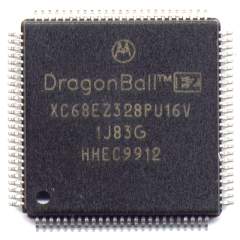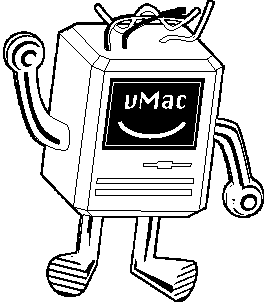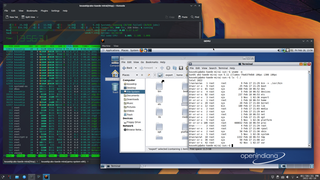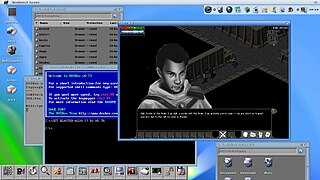
Motorola/Freescale Semiconductor's DragonBall, or MC68328, is a microcontroller design based on the famous 68000 core, but implemented as an all-in-one low-power system for handheld computer use. It is supported by μClinux. It was designed by Motorola in Hong Kong and released in 1995.

MINIX is a Unix-like operating system based on a microkernel architecture. Since version 2.0, it has been Portable Operating System Interface (POSIX) compliant.

Palm OS was a mobile operating system initially developed by Palm, Inc., for personal digital assistants (PDAs) in 1996. Palm OS was designed for ease of use with a touchscreen-based graphical user interface. It is provided with a suite of basic applications for personal information management. Later versions of the OS have been extended to support smartphones. The software appeared on the company's line of Palm devices while several other licensees have manufactured devices powered by Palm OS.
OS-9 is a family of real-time, process-based, multitasking, multi-user operating systems, developed in the 1980s, originally by Microware Systems Corporation for the Motorola 6809 microprocessor. It was purchased by Radisys Corp in 2001, and was purchased again in 2013 by its current owner Microware LP.
The Motorola 68000 series is a family of 32-bit complex instruction set computer (CISC) microprocessors. During the 1980s and early 1990s, they were popular in personal computers and workstations and were the primary competitors of Intel's x86 microprocessors. They were best known as the processors used in the early Apple Macintosh, the Sharp X68000, the Commodore Amiga, the Sinclair QL, the Atari ST and Falcon, the Atari Jaguar, the Sega Genesis, the Philips CD-i, the Capcom System I (Arcade), the AT&T UNIX PC, the Tandy Model 16/16B/6000, the Sun Microsystems Sun-1, Sun-2 and Sun-3, the NeXT Computer, NeXTcube, NeXTstation, and NeXTcube Turbo, early Silicon Graphics IRIS workstations, computers from MASSCOMP, the Texas Instruments TI-89/TI-92 calculators, the Palm Pilot, the Control Data Corporation CDCNET Device Interface, and the Space Shuttle. Although no modern desktop computers are based on processors in the 680x0 series, derivative processors are still widely used in embedded systems.

UAE is a computer emulator which emulates the hardware of Commodore International's Amiga range of computers. Released under the GNU General Public License, UAE is free software.

μClinux is a variation of the Linux kernel, previously maintained as a fork, that targets microcontrollers without a memory management unit (MMU). It was integrated into the mainline kernel as of 2.5.46; the project continues to develop patches and tools for microcontrollers. The homepage lists Linux kernel releases for 2.0, 2.4 and 2.6.
In software engineering, a compatibility layer is an interface that allows binaries for a legacy or foreign system to run on a host system. This translates system calls for the foreign system into native system calls for the host system. With some libraries for the foreign system, this will often be sufficient to run foreign binaries on the host system. A hardware compatibility layer consists of tools that allow hardware emulation.

The NXP ColdFire is a microprocessor that derives from the Motorola 68000 family architecture, manufactured for embedded systems development by NXP Semiconductors. It was formerly manufactured by Freescale Semiconductor which merged with NXP in 2015.

vMac is a free and open-source Macintosh Plus emulator which is able to run versions of System 1.1 to 7.5.5. It is available for Windows, DOS, OS/2, Mac OS, NeXTSTEP, Linux, Unix, and other platforms. Although vMac has been abandoned, Mini vMac, an improved spinoff of vMac, is still actively developed.
Descended from Copilot, Palm OS Emulator is used for writing, testing, and debugging Palm OS applications. Palm OS Emulator emulates Motorola 68000-class devices and has intimate knowledge of Palm OS's inner working, allowing for the close monitoring of correct application operation. Unlike Xcopilot, Palm OS Emulator will not boot uClinux. By using "skin" files, Palm OS Emulator could very closely mimic the appearance of many models of Palm handheld.

QEMU is a free and open-source emulator. It emulates a computer's processor through dynamic binary translation and provides a set of different hardware and device models for the machine, enabling it to run a variety of guest operating systems. It can interoperate with Kernel-based Virtual Machine (KVM) to run virtual machines at near-native speed. QEMU can also do emulation for user-level processes, allowing applications compiled for one architecture to run on another.

iPodLinux is a µClinux-based Linux distribution designed specifically to run on Apple Inc.'s iPod. When the iPodLinux kernel is booted it takes the place of Apple's iPod operating system and automatically loads Podzilla, an alternative GUI and launcher for a number of additional included programs such as a video player, an image viewer, a command line shell, games, emulators for video game consoles, programming demos, and other experimental or occasionally unfinished software.

Executor is a software application that allows Motorola 68000-based classic Mac OS programs to be run on various x86-based operating systems. Executor was created by ARDI. As of 2005, Executor development has been indefinitely postponed. As of 2008, it was published as open source software.

Linux is a family of open-source Unix-like operating systems based on the Linux kernel, an operating system kernel first released on September 17, 1991, by Linus Torvalds. Linux is typically packaged as a Linux distribution (distro), which includes the kernel and supporting system software and libraries, many of which are provided by the GNU Project. Many Linux distributions use the word "Linux" in their name, but the Free Software Foundation uses and recommends the name "GNU/Linux" to emphasize the use and importance of GNU software in many distributions, causing some controversy.
Super key (❖) is an alternative and older name for what is commonly labelled as the Windows key or Command key on modern keyboards, typically bound and handled as such by Linux and BSD operating systems and software today.

AROS Research Operating System is a free and open-source multi media centric implementation of the AmigaOS 3.1 application programming interface (API). Designed to be portable and flexible. As of 2021, ports are available for personal computers (PCs) based on x86 and PowerPC, in native and hosted flavors, with other architectures in development. In a show of full circle development, AROS has been ported to the Motorola 68000 series (m68k) based Amiga 1200, and there is also an ARM port for the Raspberry Pi series.












